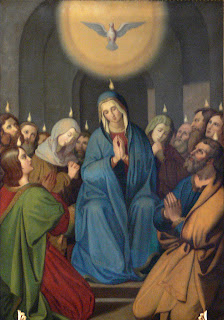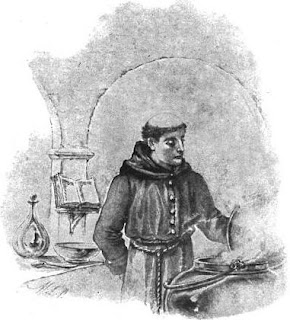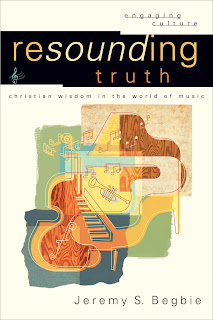I overheard my eldest last week: “God loves me and Jesus loves me.”
“And the Holy Spirit loves you”, I gently prompted.
She dutifully repeated, “And the Holy Spirit loves me.”
Already. Already she is leaving out the Holy Spirit when she thinks about our Triune God.
I know that a large part of the reason for this is that I have a hard time remembering to include the Spirit when I speak about God. But why?
Why is it that the Holy Spirit is so difficult for me to understand? It is, of course, impossible to truly know any part of the Three-In-One, but why is the Spirit so much more…mysterious?
I began to think about this, to read and study.
It seems, as I begin to search out what God says about His Spirit, that we should be hugely excited about the Holy Spirit rather than feeling awkward or embarrassed whenever someone talks of Him.
Jesus tells His disciples:
But I tell you the truth: It is for your good that I am going away. Unless I go away, the Counselor will not come to you; but if I go, I will send him to you. ~ John 16.7
The Holy Spirit is even better than having Jesus physically walking beside me through life? Why do I find that so difficult to understand and believe?
Part of my difficulty is that I truly don’t understand the Spirit. I don’t understand how He works in me or what He really does.
I continue reading, searching for some insight.
In Resounding Truth by Jeremy Begbie, I read this:
…while Christ is undoubtedly the one in whom diverse things cohere and relate in their diversity, is not the Spirit the agent of diversity, and as such the one who particularlizes things in their difference – that is, enables them to become more particularly themselves? … Or Paul in I Corinthians 12: the Spirit gives different gifts to different people, enabling each to flourish…the Spirit enables all things to be what they were particularly created to be, to praise God in their own fashion.
Elsewhere, he writes that
It is the Spirit’s role, as life-giver and transformer, to bring about here and now among us the conditions of the new age, in advance of its final and full coming. The Spirit previews the future.
Bringing about the conditions of the new age. That is truly exciting!
Clearly, there is much more to be learned, much more to the Spirit’s role in God’s kingdom…but that could fill up many books, and this is simply one essay.
As I think through this, it seems that my other main difficulty is paradoxical. I fear both that God will not answer my prayer for more of the Holy Spirit’s fruit in my life…and that He will answer my prayer for more of His Spirit!
In his book, Forgotten God, Francis Chan says
I think the fear of God failing us leads us to “cover for God”. This means we ask for less, expect less, and are satisfied with less because we are afraid to ask for or expect more…I can’t imagine how much it pains God to see His children hold back from relationship with the Holy Spirit out of fear that He won’t come through.
Jesus tells His disciples:
If you then, who are evil, know how to give good gifts to your children, how much more will the heavenly Father give the Holy Spirit to those who ask him! ~ Luke 11.13
Chan also says this:
What if God does show up but then asks you to go somewhere or do something that’s uncomfortable? … The truth is that the Spirit of the living God is guaranteed to ask you to go somewhere or do something you wouldn’t normally want or choose to do. The Spirit will lead you to the way of the cross, as He led Jesus to the cross, and that is definitely not a safe or pretty or comfortable place to be. The Holy Spirit of God will mold you into the person you were made to be.
As I think carefully about the implications of all of this added to everything else I’ve learned while studying about the Spirit, I have decided to say “yes”.
Yes, give me more of the Holy Spirit’s fruit in my life.
Yes, make me into the person I was made to be.
Yes, use me to impact the world around me.
I admit to God that I am afraid. Yet even in this fear, I am comforted by the knowledge that God is in me, to change me and help me. I am comforted by knowing that this is a process for my life, not a whiplash-like instant change. I am comforted by the Holy Spirit.
Because you are sons, God sent the Spirit of his Son into our hearts, the Spirit who calls out, “Abba, Father.” So you are no longer a slave, but a son; and since you are a son, God has made you also an heir. ~ Galations 4.6-7
These verses speak an amazing, beautiful truth…This is one of the precious gifts the Holy Spirit gives us. He assures us that we are in right standing with and loved by God…He assures us that we have nothing to fear because we are His children and He is powerful…And He reminds us of the victory that is coming when God’s kingdom is fully realized. ~ Francis Chan
Holy Spirit, please teach me, change me, show me. I want to be led by You.
For you did not receive a spirit that makes you a slave again to fear, but you received the Spirit of sonship. And by him we cry, “Abba, Father.” The Spirit himself testifies with our spirit that we are God’s children. Now if we are children, then we are heirs – heirs of God and co-heirs with Christ, if indeed we share in his sufferings in order that we may also share in his glory. ~ Romans 8.15-17
credit for art: Holy Spirit stained glass; Holy Spirit tongues of fire













